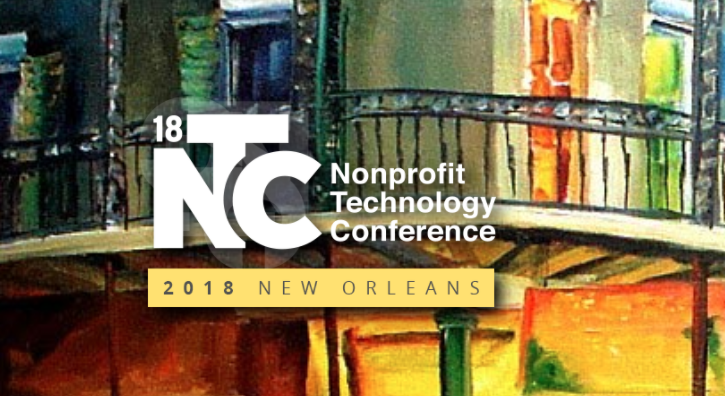NEW ORLEANS, LA. – Check your assumptions. Use a P.S. in solicitation emails. Make incremental, continuous progress toward your goals. Take the time to learn about yourself. Those were among the small lessons that had a big impact on eight speakers during Thursday morning’s Ignite sessions at the Nonprofit Technology Conference (NTC).
Almost 2,200 attendees are at NTEN’s annual conference taking place this week here in Ernest N. Morial Convention Center. During Ignite sessions, a speaker has five minutes for their presentations, featuring 20 slides, advanced automatically every 15 seconds. This year’s theme was “My biggest smallest lesson,” featuring speakers sharing their story of a small lesson that had a big impact.
Several years ago, B.J. Wishinsky was building online communities of women and computing when she was told not to bother with profiles that have no pictures because they’re likely spammers or newbies. Later, at another job, she found lots of her organization’s Twitter followers had the default egg profile. “What was prompting them to follow us,” she wondered. Eventually, Wishinsky realized that someone who can’t see images might choose not to bother with profile photos. “The problem was not spammers or newbies but followers who could not see them,” she said.
Wishinsky learned to make social content more inclusive, adding image descriptions in social media posts and dove deeper into issues around access for people with disabilities. “Your stakeholders might not match your initial assumptions,” she said. “I can guarantee you there are people with disabilities in your communities. Can they get into your events? How accessible is your website? Exactly how are we welcoming a diverse community of people of different identities?”
For Sonia Adamson, it was something as simple as a P.S. line in an email solicitation. As assistant director of events outreach and communications at the University of Pennsylvania, she helps design marketing pieces that raise money for the annual fund, Penn Parents Fund. In recent years, they started an annual day of giving for Giving Tuesday.
After four years, Adamson said they researched what can have an immediate impact, at little cost, to meet goal. Research showed that people open email, read the first line and scroll to the bottom. “We want our message to be at the bottom,” she said, asking to save the best for last. “It might be the last thing you write on your email but it has some impact,” Adamson said.
They worried that they would never reach their $50,000 goal in the first year and most recently, they raised almost $323,000, driven by asking parents for a $2,500 gift to become giving society members.
“Don’t be afraid to try something new, you have nothing to lose to implement something new,” Adamson said.
Michelle Soto founded Letters of Hope while also working a full-time job. The self-described “to-do list enthusiast” was sometimes overwhelmed by them.
“I kept a list but had to think of a way to keep a list yet balance and minimize my life and have clear expectations,” she said. Her lists now have five essential subjects (health, wealth, work, family and friends), with a goal to hit each one daily. “My list became a lot shorter. The days of looking at a long list and still having 15 things to do are gone. Now I just have five,” she said.
Soto thought of her mother when considering how to make her list shorter. As a teen, she remembers her mother coming home with a takeout box. She and her sister couldn’t comprehend that their mother went out to eat alone to be by herself. “Take the time to learn about ourselves. Taking the time out was critical, I’m glad that my mom showed me,” she said. “Never stop learning but also never stop learning about yourself.”
Meico Marquette Whitlock wanted to learn to swim as an adult. He worked his way up from kicking and paddling in a pool to completing a one-mile, open water swim race after four years. “I didn’t win the gold. I didn’t break any world records, but I did win,” Whitlock said.
“Winning isn’t about comparing yourself to others. It’s not a zero/sum game. Your life is your game, and you’re the only competitor in your race. You can’t see in front of you if looking at others,” Whitlock said. But, you have to continuously get up over and over, even when it feels inconsequential, because those small things add up to big things over time.
“Do that one thing over and over again that push you across the goal,” he said. For Whitlock, that was showing up for swim practice every time, despite the anxiety and stress.











